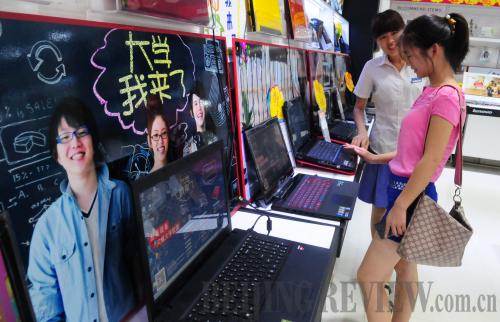|
 |
|
TECHNOLOGICAL INVESTMENT: A student browses laptop computers in a store in Liaocheng, Shandong Province, on August 19. The sale of digital products has been recently boosted as many new college freshmen shop for them prior to the start of their first semester in September (ZHANG ZHENXIANG) |
Anti-Trust Probe
A total of 12 Japanese auto parts and bearing makers have been fined 1.24 billion yuan ($201 million) owing to their collusion in creating a price monopoly, the National Development and Reform Commission (NDRC) confirmed on August 20.
The Japanese auto parts suppliers punished include Hitachi, Denso, Aisan, Mitsubishi Electric, Mitsuba, Yazaki, Furukawa, Sumitomo and bearing makers are Nachi, NSK, JTEKT and NTN.
Hitachi and Nachi were exempted from the punishment as they were the first Japanese companies to report their monopoly agreements and offer important evidence in this regard, the NDRC said.
The fines to 10 other companies varied from 290 million yuan ($47.14 million) to 29.76 million yuan ($4.84 million), according to the NDRC.
The eight Japanese auto parts suppliers were found to have frequently met bilaterally or multilaterally in Japan from January 2000 to February 2010, negotiating over prices and implementing agreements over quoted prices concerning orders from the Chinese market.
The four bearing makers were also found to have jointly convened meetings in Japan and Shanghai from 2000 to June 2011 to discuss the timing and scope of price hikes for bearing products in the Chinese market and later raised their price according to these negotiations, the NDRC said.
Such moves by the 12 Japanese auto parts and bearing suppliers were in violation of the Chinese Anti-Monopoly Law, which prohibits behavior excluding or restraining market competition and thus damaging the rights and interests of downstream manufacturers and consumers, the NDRC said.
Housing Prices Drop
China's property sector showed new signs of cooling in July, with more cities reporting month-on-month price drops, official data showed on August 18.
Out of 70 major Chinese cities, 64 saw month-on-month price declines for new homes in July, compared with 55 in June, the National Bureau of Statistics (NBS) said.
Only two cities—Xiamen in southeast China's Fujian Province and Dali in southwest China's Yunnan Province—saw month-on-month gains in new home prices last month, compared with eight cities in June and 15 cities in May, the NBS data showed.
The growth rates in the 65 cities moderated significantly in July, said Liu Jianwei, a senior statistician at the NBS.
Liu said many home buyers were adopting a wait-and-see attitude due to uncertain market prospects, which had led to month-on-month drops in home prices in more Chinese cities.
The latest data added to fears that China's property market is experiencing an obvious downturn after dismal growth in the last few years.
Zhang Dawei, chief analyst at real estate agent Centaline Property, said the latest data suggested that the cooling trend was still evident. Growth of property investment starting in February has decelerated for six months straight.
FDI Falters
Foreign direct investment (FDI) into the Chinese mainland fell sharply again in July, slumping 16.95 percent from a year earlier to $7.81 billion, the Ministry of Commerce (MOFCOM) said on August 18.
The sharp decline was in contrast with a 0.2-percent increase in June, according to the ministry.
For the first seven months, the FDI, which excludes investment in the financial sector, stood at $71.14 billion, down 0.35 percent from the same period last year.
MOFCOM spokesman Shen Danyang said year-on-year fluctuation of inbound FDI data is totally normal.
"It has nothing to do with the recent anti-trust probes. The Chinese Government launched such probes with the aim of creating a fair market for all market participants," he said.
Meanwhile, the outbound FDI by Chinese non-financial companies soared 84.9 percent from previous year in July, compared with a year-on-year decline of 5 percent in the January-June period.
| 